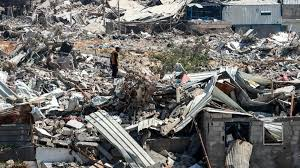Israel Reduces Troop Presence in Southern Gaza Amidst Peace Talks and Calls for Hostage Release
In a recent development, Israel’s military announced a reduction in its troop deployment from southern Gaza, leaving just one brigade in the area while emphasizing that a “significant force” would remain. Lt. Col Peter Lerner, spokesman for the Israel Defense Forces (IDF), stated that this move marks another phase in the ongoing conflict but does not necessarily signal an imminent end to hostilities.
The decision coincides with renewed ceasefire negotiations in Cairo, with both Israel and Hamas sending delegations to participate. This initiative follows six months since Hamas initiated attacks on southern Israeli border communities, resulting in casualties and hostages.
According to official reports, there are still hostages held in Gaza, with some confirmed fatalities among them. The situation has led to international concerns, particularly regarding civilian casualties and humanitarian crises, such as the reported famine-like conditions in Gaza.
Lt. Col Lerner clarified that the troop reduction is specific to the completion of a mission in Khan Younis, a city heavily affected by Israeli bombardment. Despite this reduction, he emphasized that the conflict is ongoing, with further operations required, particularly in strongholds like Rafah.
While initially perceived as a “rest and refit” maneuver by some, Israeli Defense Minister Yoav Gallant asserted that the troops’ departure aims to prepare for subsequent missions. He highlighted the achievements in Khan Younis, indicating a significant impact on Hamas’s military capabilities.
The ongoing conflict has prompted international pressure for a ceasefire, with the United States, Israel’s ally, emphasizing the need for concrete steps to address humanitarian concerns and prevent civilian casualties. Israeli Prime Minister Benjamin Netanyahu underscored Israel’s stance, stating that no ceasefire would occur without the release of Israeli hostages.
Protests have erupted across Israel, with tens of thousands rallying against the government’s handling of the conflict and demanding action for the release of hostages. The demonstrations reflect public sentiment and the urgency to address the humanitarian crisis and seek a resolution to the prolonged conflict.

